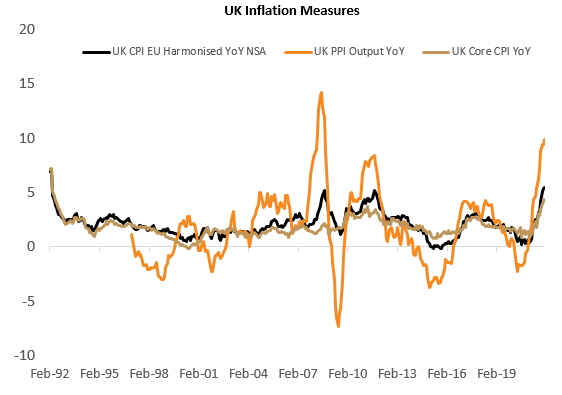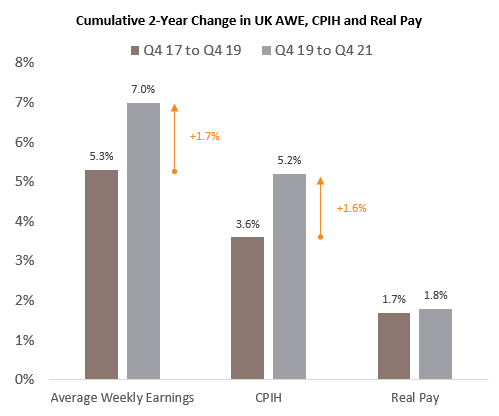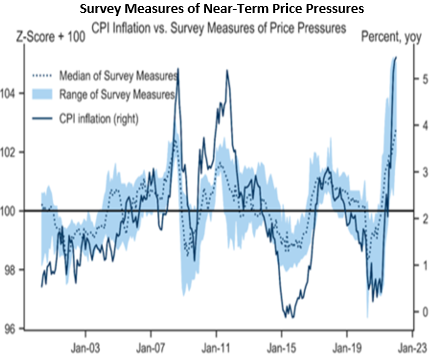
Introduction
Similar to across the Atlantic, prices and wages are accelerating in the UK.
Similar to across the Atlantic, which we highlighted in our last piece, once again in January CPI accelerated in the UK. Headline inflation reached 5.5% year-on-year (YoY), the highest since 1992. The acceleration partly reflects large increases in both the energy and food components, but core inflation – which excludes food and energy and better reflects underlying pressures – also made a new high since 1992 at 4.4% YoY, well above the Bank of England (BoE) 2.0% target.
It is beyond doubt that price pressures are broad-based in the UK, with both core goods and core services inflation now faster than 2.0% and higher than they were at the end of 2019 before the pandemic. At the same time, the producer price index accelerated to 9.9% YoY in January, the fastest since 2008.

Price increases have been broad based in the UK, with all components posting significant increases.
Source: Bloomberg LLP, Fulcrum Asset Management LLP
Broad-based price pressures are also visible in accelerating nominal wage growth. In the 2-year period from Q4 2019 to Q4 2021 average weekly earnings (AWE) have grown by a cumulated 7.0%, up from a cumulated 5.3% increase in the pre-pandemic 2-year period from Q4 2017 to Q4 2019, accelerating by 1.7 percentage points.
With a remarkable similarity, the consumer price index including housing costs (CPIH), which the office for national statistics (ONS) uses to deflate average weekly earnings to calculate real pay, has accelerated by 1.6 percentage points from a cumulated 3.6% in the pre-pandemic Q4 2017 – Q4 2019 period to a cumulated 5.2% in the subsequent Q4 2019 – Q4 2021 period.
Reflecting this simultaneous and very similar acceleration of nominal wages and consumer prices, real pay growth – the difference between AWE growth and CPIH growth – has remained about stable close to a cumulated 1.75% in both 2-year periods. Real pay spiked in 2020 but has been close to zero in 2021.

Source: Bloomberg LLP, Fulcrum Asset Management LLP
Worryingly for the Bank of England, the simultaneous acceleration of wages and consumer prices has been accompanied by a surge in inflation expectations. The 5-year break even RPI inflation rate has risen to about 4.5% from about 2.9% in late 2019 before the pandemic. Survey measures of price pressures are now the highest they have ever been in more than two decades.

Survey measures of near-term price pressures continue to rise.
Survey measures are: 1) CBI average price of domestic orders; 2) Gfk consumer prices; 3) Composite PMI input and output prices; 4) BoE agents’ material costs, consumer goods and services. Source: Haver Analytics, Goldman Sachs Global Investment Research
This material is for your information only and is not intended to be used by anyone other than you. It is directed at professional clients and eligible counterparties only and is not intended for retail clients. The information contained herein should not be regarded as an offer to sell or as a solicitation of an offer to buy any financial products, including an interest in a fund, or an official confirmation of any transaction. Any such offer or solicitation will be made to qualified investors only by means of an offering memorandum and related subscription agreement. The material is intended only to facilitate your discussions with Fulcrum Asset Management as to the opportunities available to our clients. The given material is subject to change and, although based upon information which we consider reliable, it is not guaranteed as to accuracy or completeness and it should not be relied upon as such. The material is not intended to be used as a general guide to investing, or as a source of any specific investment recommendations, and makes no implied or express recommendations concerning the manner in which any client’s account should or would be handled, as appropriate investment strategies depend upon client’s investment objectives. Funds managed by Fulcrum Asset Management LLP are in general managed using quantitative models though, where this is the case, Fulcrum Asset Management LLP can and do make discretionary decisions on a frequent basis and reserves the right to do so at any point. Past performance is not a guide to future performance. Future returns are not guaranteed and a loss of principal may occur. Fulcrum Asset Management LLP is authorised and regulated by the Financial Conduct Authority of the United Kingdom (No: 230683) and incorporated as a Limited Liability Partnership in England and Wales (No: OC306401) with its registered office at Marble Arch House, 66 Seymour Street, London, W1H 5BT. Fulcrum Asset Management LP is a wholly owned subsidiary of Fulcrum Asset Management LLP incorporated in the State of Delaware, operating from 350 Park Avenue, 13th Floor New York, NY 10022.
©2022 Fulcrum Asset Management LLP. All rights reserved
FC049W 220222
About the Author
Filippo Cartiglia
Filippo is a member of the Investment Team. Before joining Fulcrum in 2020, he was the chief economist at Arrowgrass Capital Partners LLP. Prior to this, Filippo was Managing Director at Goldman Sachs, partner at Newman Ragazzi LLP, and an economist at the International Monetary Fund in Washington. Filippo graduated from Bocconi University in Milan in 1988 and gained a PhD in Economics from Columbia University in New York in 1992.

About the Author
Rahil Ram
Rahil Ram is a Director at Fulcrum Asset Management and is involved in portfolio strategy, portfolio implementation, research, sustainability and idea generation for the discretionary macro and thematic strategies. Prior to joining Fulcrum, Rahil was a strategist within the Asset Allocation team at Legal & General Investment Management for five years, during which time he completed his Masters’ in Actuarial Management from Cass Business School and qualified as an Actuary in 2017.



